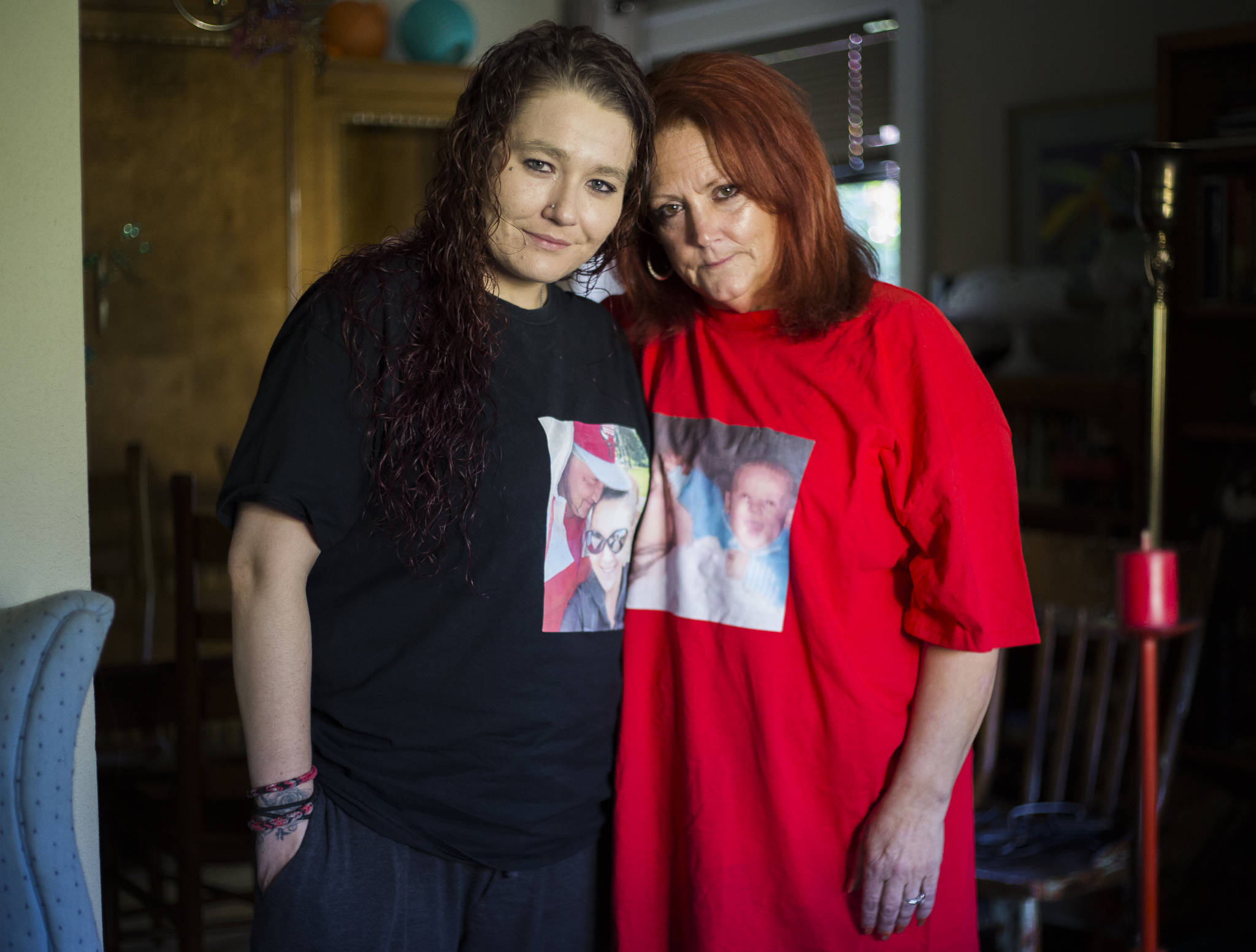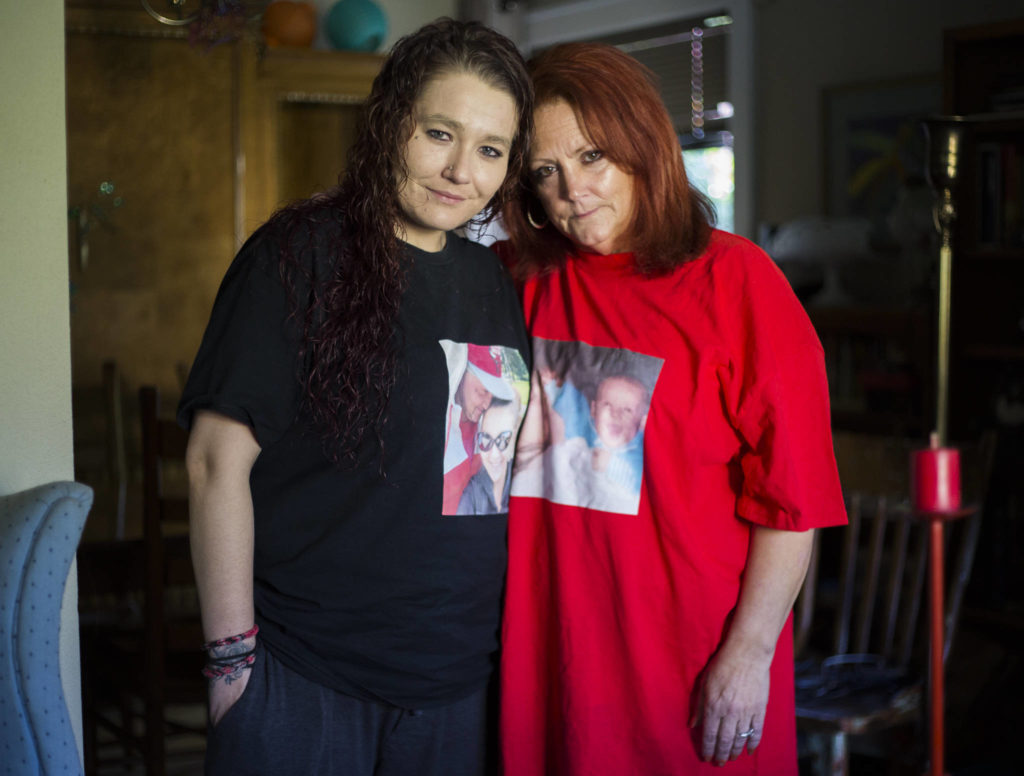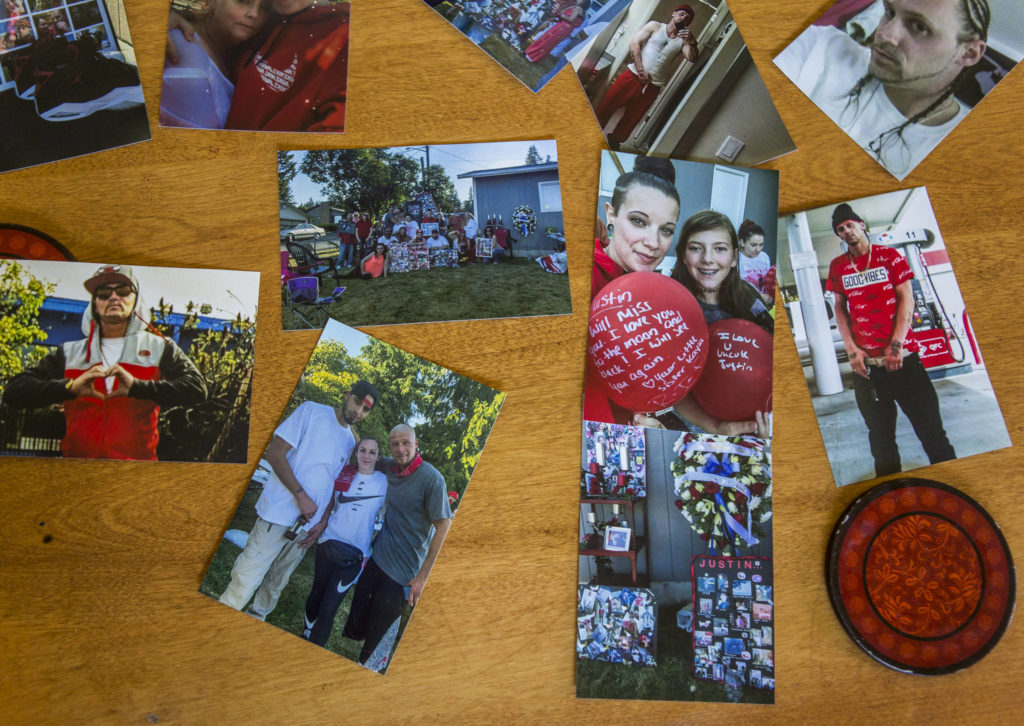Justin Murphy, 36, died Aug. 4 in a motel room on Everett’s Broadway.
Surrounded by pictures of the son she adored and didn’t give up on, his mother spoke Thursday of a life dogged by addiction and dragged down by years spent behind bars.
“They say most drug addicts will either end up dead or in prison. We need to change that,” said Kym Murphy, his 57-year-old mother, who has battled her own drug demons.
Two days after her son died of an overdose, she sent an email to The Daily Herald. “My name is Kym Murphy and my son is a victim of the crisis that is affecting our kids,” she said in the message.
She wrote of the Justin she knew, describing him as kind, loving “and a drug addict.”
There may be readers who’ll wonder — why write about a man whose criminal record shows dozens of arrests, a man with a long history of cases involving possession of controlled substances?
In his mother’s own words, this is why: “It’s worth it if it helps one person,” she said.
At the home she rents in north Everett, Murphy and her son’s longtime partner, Lathana Neese, talked about their own struggles and the man they are both mourning. Neese, 28, said that although they weren’t legally married they considered each other husband and wife. The young woman is living with Kym Murphy and calls her “Mom.”
Justin Murphy’s record alone is evidence that the current approach to the nightmare of addiction is not working. A revolving door of arrests, incarceration and release into communities where some find help but others can’t — or won’t — clearly is leaving hundreds of people to struggle until they die.
On Wednesday, The Herald’s Joseph Thompson reported that, according to Snohomish Health District data, more people in the county died of overdoses between March and July than in all of 2019. Since March, that death toll is 119 people. One third of those cases involved fentanyl, the synthetic opioid deemed by the Centers for Disease Control and Prevention to be 50 to 100 times stronger than morphine.
Justin was found, dead and alone, in the motel room, his mother said Thursday. Nicole Daugherty of the county Medical Examiner’s Office said he died of an overdose, “acute combined methamphetamine and fentanyl intoxication.”
“I’d like to focus on the lack of help. So many crimes and deaths could be prevented,” said Murphy, whose son was in prison on a charge of drug possession with intent to sell from 2014 to 2017. He served time at the Monroe Correctional Complex, Clallam Bay Corrections Center and the Washington State Penitentiary at Walla Walla.
“In prison, he learned to be a better drug addict and criminal. Prison is not for addicts,” she said.
Yet Kym Murphy, who said she’s been clean from meth use since 2015, credits the help she received at the Washington Corrections Center for Women with starting her journey to a better life. “I was an addict. I went to prison,” she said, adding that her charges involved identity theft and drugs.
Upon release after four years, she said, “I stayed in clean-and-sober houses. At Purdy, the people at the prison offered these things,” she said.
Also an admitted addict, Neese pleaded guilty to robbery and kidnapping in a 2012 drug-related attack. She was the driver of a car in which one man in the vehicle stabbed another man, who was shortly afterwards found dead. Sentenced to six years behind bars, she met Justin’s mother while incarcerated.
Neese said Justin tried to get medication-assisted treatment in March after a stay in jail, where he’d been helped by Suboxone. A medication containing buprenorphine and naloxone, Suboxone is used to treat opioid addiction. Neese said they went multiple times to a local clinic that provides Suboxone, but that Justin’s insurance had lapsed and they were turned away.
He went back to what he knew, opioids, Neese and Murphy said.
Both women remember better times.
Born Oct. 5, 1983, Justin Montgomery Murphy grew up in Seattle’s Ballard area and in Kirkland. Kym Murphy said she and Justin’s father, who’s now deceased, separated when their boy was just 2.
She remembers long-ago Christmases when Justin would be proud to use his own money to buy gifts. “He’d start saving his allowance after his birthday so he could buy for his aunts, his grandma and me,” she said. “As a young boy he liked to build bicycles. And he wanted to get into computers.”
His drug use began with marijuana and Ecstasy when he was in junior high. By the time he was 16 or 17, Murphy said she was using cocaine and crack. “I started through the man I married. I lost my job, my house, everything,” she said. “I carry a lot of guilt.”
Neese recalled that around 2018 Justin “stayed clean for a little over a year” while on Department of Corrections supervision. That time gave her a glimpse of what might have been. “I’ve seen that side of both of us. It gave me hope,” she said. Losing the man she loves has “definitely made me rethink my lifestyle,” Neese said.
Angry about the lack of help, the women say Justin wasn’t offered drug court or drug offender sentencing alternative (DOSA), which lets some incarcerated offenders serve a reduced sentence in exchange for completing a chemical-dependency treatment program.
“Even if this just touches one person, one lawmaker or one prosecutor, they need to offer that help,” Kym Murphy said. “He was a person, my son. He has a name. He didn’t want to be a drug addict.”
Julie Muhlstein: 425-339-3460; jmuhlstein@heraldnet.com.
Overdose Awareness Day
Aug. 31 each year is recognized as International Overdose Awareness Day. On online event, “A Night to Remember-A Time to Act,” is scheduled for 6-8:30 p.m Monday. Hosted by Hope Soldiers, it’s presented in partnership with the Snohomish Health District and Snohomish Overdose Prevention, with support from the county Executive’s Office, mayors of Mukilteo, Everett, Lynnwood and others. The aim is to honor those who have lost their battle with addiction and educate the community. Information on Facebook, search for Snohomish County Overdose Awareness Day.
Talk to us
> Give us your news tips.
> Send us a letter to the editor.
> More Herald contact information.




























